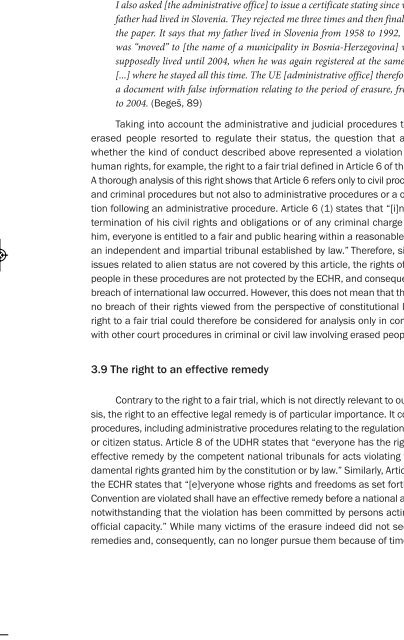The Scars of the Erasure_web
The Scars of the Erasure_web
The Scars of the Erasure_web
- No tags were found...
You also want an ePaper? Increase the reach of your titles
YUMPU automatically turns print PDFs into web optimized ePapers that Google loves.
<strong>Erasure</strong>_4a 10.1.11 20:29 Page 104104 THE SCARS OF THE ERASUREarchival documents is <strong>of</strong>ten false. For example, <strong>the</strong> record <strong>of</strong> an erased womanwhose mo<strong>the</strong>r was a Croatian and fa<strong>the</strong>r a Slovenian states that from 26 February1992 her permanent address was “Croatia,” although she never lived anywhereoutside Slovenia. Begeš’s example is also illustrative:I also asked [<strong>the</strong> administrative <strong>of</strong>fice] to issue a certificate stating since when myfa<strong>the</strong>r had lived in Slovenia. <strong>The</strong>y rejected me three times and <strong>the</strong>n finally issued<strong>the</strong> paper. It says that my fa<strong>the</strong>r lived in Slovenia from 1958 to 1992, when hewas “moved” to [<strong>the</strong> name <strong>of</strong> a municipality in Bosnia-Herzegovina] where hesupposedly lived until 2004, when he was again registered at <strong>the</strong> same address[...] where he stayed all this time. <strong>The</strong> UE [administrative <strong>of</strong>fice] <strong>the</strong>refore issueda document with false information relating to <strong>the</strong> period <strong>of</strong> erasure, from 1992to 2004. (Begeš, 89)Taking into account <strong>the</strong> administrative and judicial procedures to whicherased people resorted to regulate <strong>the</strong>ir status, <strong>the</strong> question that arises iswhe<strong>the</strong>r <strong>the</strong> kind <strong>of</strong> conduct described above represented a violation <strong>of</strong> <strong>the</strong>irhuman rights, for example, <strong>the</strong> right to a fair trial defined in Article 6 <strong>of</strong> <strong>the</strong> ECHR.A thorough analysis <strong>of</strong> this right shows that Article 6 refers only to civil proceedingsand criminal procedures but not also to administrative procedures or a court actionfollowing an administrative procedure. Article 6 (1) states that “[i]n <strong>the</strong> determination<strong>of</strong> his civil rights and obligations or <strong>of</strong> any criminal charge againsthim, everyone is entitled to a fair and public hearing within a reasonable time byan independent and impartial tribunal established by law.” <strong>The</strong>refore, since <strong>the</strong>issues related to alien status are not covered by this article, <strong>the</strong> rights <strong>of</strong> erasedpeople in <strong>the</strong>se procedures are not protected by <strong>the</strong> ECHR, and consequently, nobreach <strong>of</strong> international law occurred. However, this does not mean that <strong>the</strong>re wasno breach <strong>of</strong> <strong>the</strong>ir rights viewed from <strong>the</strong> perspective <strong>of</strong> constitutional law. <strong>The</strong>right to a fair trial could <strong>the</strong>refore be considered for analysis only in connectionwith o<strong>the</strong>r court procedures in criminal or civil law involving erased people.3.9 <strong>The</strong> right to an effective remedyContrary to <strong>the</strong> right to a fair trial, which is not directly relevant to our analysis,<strong>the</strong> right to an effective legal remedy is <strong>of</strong> particular importance. It covers allprocedures, including administrative procedures relating to <strong>the</strong> regulation <strong>of</strong> alienor citizen status. Article 8 <strong>of</strong> <strong>the</strong> UDHR states that “everyone has <strong>the</strong> right to aneffective remedy by <strong>the</strong> competent national tribunals for acts violating <strong>the</strong> fundamentalrights granted him by <strong>the</strong> constitution or by law.” Similarly, Article 13 <strong>of</strong><strong>the</strong> ECHR states that “[e]veryone whose rights and freedoms as set forth in thisConvention are violated shall have an effective remedy before a national authoritynotwithstanding that <strong>the</strong> violation has been committed by persons acting in an<strong>of</strong>ficial capacity.” While many victims <strong>of</strong> <strong>the</strong> erasure indeed did not seek legalremedies and, consequently, can no longer pursue <strong>the</strong>m because <strong>of</strong> time limita-


